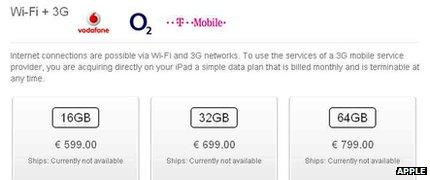Motorola makes Apple pull iPads and iPhones in Germany
- Published

Apple has pulled several iPad and iPhone models from its German online store after Motorola Mobility enforced a patent injunction against its rival.
The move follows a December ruling that Apple had failed to license one of Motorola's wireless intellectual properties.
iPhone users in Germany may also face the loss of their push email iCloud service after a separate patent victory by Motorola.
Apple has said it will appeal.
The dispute may eventually pit Apple against Google. The search giant is in the process of taking over the Razr handset-maker. The deal still needs to clear the competition authorities.
Pulled products
The sales ban relates to Motorola's patent for a "method for performing a countdown functionduring a mobile-originated transfer for a packet radio system".
Motorola licenses the patent to other companies on Frand (fair, reasonable and non-discriminatory) terms.
Frand-type patents involve technologies that are deemed to be part of an industry standard. In this case Motorola's innovation is deemed crucial to the GPRS data transmission standard used by GSM cellular networks across the world.
Companies must offer Frand-type patents for a reasonable fee to anyone willing to pay.
Apple has said it would be willing to pay the fee going forward, but the two firms dispute how much Apple should pay for failing to license the technology up until now. Missed payments are not covered by the "reasonable" rule, and Motorola would be able to demand a more expensive price.
Apple said: "While some iPad and iPhone models are not available through Apple's online store in Germany right now, customers should have no problem finding them at one of our retail stores or an authorised reseller.
"Apple is appealing this ruling because Motorola repeatedly refuses to license this patent to Apple on reasonable terms, despite having declared it an industry standard patent seven years ago."
Motorola said it had offered Apple "reasonable licensing terms and conditions" since 2007.
"We are pleased that the Mannheim court has recognized the importance of our intellectual property and granted an enforceable injunction in Germany against Apple Sales International," a statement said.
Apple's iPhone 3G, iPhone 3GS and iPhone 4 are all affected - but not its newer iPhone 4S. All 3G models of the iPad are involved, but not their wi-fi-only counterparts.
Email technology
The separate push email ban would only come into effect if Motorola decided to enforce a second judgement that Apple's iCloud and MobileMe infringed another of its innovations.
The patent relates totwo-way communications between pagers and other devicesand was granted in 2002.
If Motorola decides to enforce the judgement some iPhone users in Germany would lose the ability to automatically receive emails as soon as they have been sent. Instead they would either have to manually check their accounts or set their devices to periodically check for updates.
This patent is not deemed to be critical to an industry standard, so the firm does not have to license the technology to Apple even if the iPhone-maker offered to pay.
Apple said that it believed the patent involved was invalid, adding that it was appealing against the decision.
Although the two cases only apply to Germany they may have implications for other European lawsuits. EU rules say different countries' courts can reach different conclusions, but must explain why.
Patent consultantFlorian Mueller notes on his blogthat Apple has brought patent claims of its own against Motorola in Germany, and that Motorola also faces a lawsuit filed by Microsoft which is due to be considered next Tuesday.
- Published8 March 2012
- Published8 March 2012
- Published8 March 2012